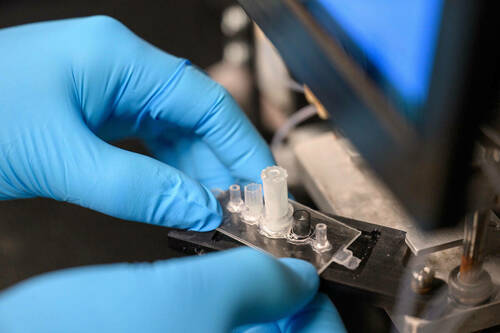Rapid Blood Test Diagnoses Brain Cancer in Less Than an Hour
Posted on 28 Aug 2024
Glioblastoma, an aggressive and currently incurable brain cancer, typically leaves the average patient with a life expectancy of 12-18 months post-diagnosis. Now, a groundbreaking device is capable of diagnosing glioblastoma in less than an hour. This device's central component is a biochip that employs electrokinetic technology to identify biomarkers, specifically active Epidermal Growth Factor Receptors (EGFRs), which are commonly overexpressed in several cancers, including glioblastoma, and found in extracellular vesicles.
Extracellular vesicles, or exosomes, are unique and considerably large nanoparticles secreted by cells. To develop the device, the research team at the University of Notre Dame (Notre Dame, IN, USA) faced a dual challenge: distinguishing active from non-active EGFRs and building a diagnostic tool that could sensitively and selectively detect active EGFRs on extracellular vesicles from blood samples. Their solution was a biochip integrating an economical electrokinetic sensor the size of a ballpoint pen ball. This setup allows antibodies on the sensor to bind multiple times to a single vesicle, greatly enhancing both the sensitivity and specificity of the diagnosis. Additionally, synthetic silica nanoparticles are used to signal the presence of active EGFRs on captured vesicles, contributing a strong negative charge that causes a voltage shift detectable when active EGFRs are present, signaling glioblastoma.

This innovative charge-sensing approach reduces the common interferences seen in other sensor technologies that rely on electrochemical reactions or fluorescence. The diagnostic system comprises three main components: an automation interface, a portable machine prototype that supplies the necessary materials for the test, and the biochip itself. Each analysis, which consumes only 100 microliters of blood and is completed in under an hour, requires a new biochip, costing less than USD 2 to produce, while the automation interface and prototype are reusable. While initially developed for glioblastoma, this technology is versatile enough for potential adaptation to other diseases by detecting various biological nanoparticles. The research team is currently investigating its application in diagnosing pancreatic cancer and other conditions such as cardiovascular disease, dementia, and epilepsy.
“Our electrokinetic sensor allows us to do things other diagnostics cannot,” said Satyajyoti Senapati, a research associate professor of chemical and biomolecular engineering at Notre Dame and co-author of the study. “We can directly load blood without any pretreatment to isolate the extracellular vesicles because our sensor is not affected by other particles or molecules. It shows low noise and makes ours more sensitive for disease detection than other technologies.”
Related Links:
University of Notre Dame







 Analyzer.jpg)





